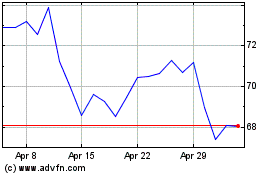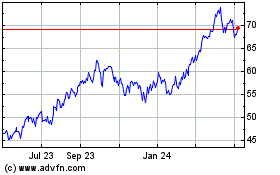Canadian Senate: No Offshore Drilling Ban Needed
August 18 2010 - 2:18PM
Dow Jones News
The risk of an oil spill in Canadian waters similar to the
disaster in the Gulf of Mexico is low enough that the government
shouldn't ban offshore drilling, the Canadian Senate said
Wednesday.
The Senate's Committee on Energy, the Environment and Natural
Resources released a report of its findings on the safety of
Canada's offshore oil and gas drilling after conducting six weeks
of hearings.
"We wanted to find out if there was any imminent danger, and we
found that there was not," said Sen. David Angus, who chairs the
committee, during a press conference in Ottawa. "We were satisfied
that the safety precautions and oversight of the operations were
adequate."
Angus said there is only one offshore well being drilled in
Canada, by Chevron Corp. (CVX) 420 kilometers off the coast of
Newfoundland.
Chevron's well is being drilled in even deeper waters than in
the Macondo field where a rig leased by BP Plc (BP, BP.LN) exploded
in April, leaking hundreds of thousands of barrels of oil into the
Gulf. But the committee said in its report that Chevron was
operating safely and recommended that the "Chevron operation
continue as planned."
The senators also said safety precautions for Canada's existing
offshore oil and gas operations off the east coast were robust, and
in some cases stronger than U.S. regulations.
"There is a much stronger chain of command [in Canada] for when
the government can take over a spill than there was in the BP
Macondo incident," said Sen. Grant Mitchell, a liberal lawmaker
from Alberta who was the deputy chair of the bipartisan
committee.
However, the committee did not investigate the potential safety
issues of deep-water drilling in Canada's arctic, saying it was up
to the National Energy Board, Canada's federal energy regulator, to
investigate those issues. Drilling relief wells and other disaster
relief efforts would be more difficult in the arctic due to the
remote location and extreme weather.
Canada has sold leases for offshore arctic exploration to BP
Plc, Exxon Mobil Corp. (XOM) and Imperial Oil Ltd. (IMO, IMO.T),
but the companies aren't allowed to begin actual exploration until
they get NEB approval.
The Senate committee's report issued two notable recommendations
for future study. It said that the potential for conflicts of
interest at provincial energy regulators that both regulate and
promote offshore oil and gas development should be studied.
It also recommended that guidelines be established for when
producers should be required to drill relief wells as a safety
precaution.
About 12% of Canada's conventional oil comes from offshore
drilling in the country's east coast, and it has revitalized the
economies of Newfoundland and Nova Scotia. About one in every 20
jobs in Newfoundland comes from the oil and gas industry, Mitchell
said.
-By Edward Welsch, Dow Jones Newswires; 403-229-9095;
edward.welsch@dowjones.com
Imperial Oil (AMEX:IMO)
Historical Stock Chart
From Jun 2024 to Jul 2024

Imperial Oil (AMEX:IMO)
Historical Stock Chart
From Jul 2023 to Jul 2024
